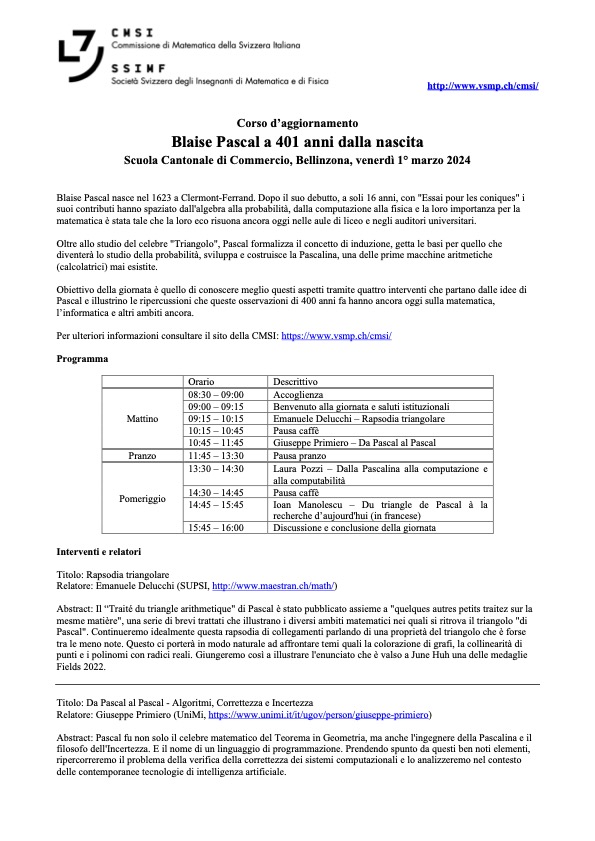Giuseppe Primiero will give a talk titled “Da Pascal al Pascal” at the school “Blaise Pascal a 401 anni dalla nascita”, which will take place on March 1, 2024 in Bellinzona, Switzerland.

BRIO – Bias, Risk and Opacity in AI
National Research Project (PRIN MUR)
Giuseppe Primiero will give a talk titled “Da Pascal al Pascal” at the school “Blaise Pascal a 401 anni dalla nascita”, which will take place on March 1, 2024 in Bellinzona, Switzerland.

On January 11, 4-6pm CET, Giuseppe Primiero will present current joint work with Francesca Doneda and Francesco A. Genco on “Trustworthiness Ranking with Uncertain Information” at the joint colloquium of the Chair of Theory of Science and Technology/ Computational Science Study Lab at RWTH Aachen University and the Department of Philosophy of Science and Technology of Computer Simulation at the High Performance Computing Center Stuttgart.
The workshop “Trustworthy AI – Conceptual Challenges and Applications” organised by Mattie Petrolo e Giacomo Zanotti will take place on February 16, 2024 at Politecnico di Milano (Room Alpha, Building 24, Politecnico di Milano, Via Golgi, 40, 20133 Milano).
For more information on the program and on attendance, here is the page of the event:
Trustworthy AI – Conceptual challenges and applications
Giuseppe Primiero will give a talk titled “The role of verification in Trustworthy AI” at the 19th Annual Conference of the Italian Association of Cognitive Sciences (AISC2023). The conference will take place at the University of Genoa, Italy the 14–16 December 2023. The talk will be on the 15th of December 2023, 14.45-15.05.
While a variety of tools are being developed to make ML systems more transparent, logical methods are coming back to play an increasingly important role: by their nature, they may help building and verifying transparent models of computations. A major aim is therefore to develop formal methods that will help the verification of these systems’ trustworthiness and fairness. In this lecture, I will present some recent work in this direction. I will overview the methodology and sketch some principles of the logics developed within the BRIO (Bias, Risk and Opacity in AI) Project (sites.unimi.it/brio) to reason within and about programs with probabilistic outputs obtained under possibly opaque distributions. Under this approach trustworthiness can be formally verified as an admissible distance from the behavior of a fair and transparent counterpart.
Roberta Ferrario and Emanuele B. Grifoni are giving a Laboratory for an inter-university Master’s Degree Program (University of Bergamo, University of Pavia and IUSS Pavia). The laboratory is about applied ontologies and it is titled “Philosophical Knowledge: Foundations, Methods, Applications”. The laboratory will take place from the 13 December 2023 until the 21 December 2023 at the University of Bergamo.
Emanuele B. Grifoni gave a talk titled “Lions we think we understand. A Wittgensteinian critique of Large Language Models” at the workshop Formalization, Modellization, and Representation of Social Pattern Analyses (ForMoRe). The workshop was organised by the Social Pattern Recognition Lab (SPaRe Lab) and by the Hans Schadee Methods Center (HSC). The workshop took place on November 20, 2023 in Trento, Italy.
https://webmagazine.unitn.it/evento/sociologia/116210/formore-workshop
Emanuele B. Grifoni will give a talk titled “Judgements, Definitions and Intrinsic Bias in Large Language Models”at the 19th Annual Conference of the Italian Association of Cognitive Sciences (AISC2023). The conference will take place at the University of Genoa, Italy the 14–16 December 2023. The talk will be on the 14th of December 2023, 17.30-17.50.
Through Wittgenstein’s “Investigations” we illustrate an intrinsic bias of Large Language Models (LLMs) at the design level. The current statistical approach cannot account for the normative aspect of rule-following and therefore of communication. This, we believe, is also at the basis of phenomena like “hallucinations” or “confabulations” in LLMs.
Giacomo Zanotti will present two papers at the 19th Annual Conference of the Italian Association of Cognitive Sciences (AISC 2023): “Explanation(s), Understanding and Trustworthy AI” and “Affective artificial agents and the problem of transparency” (joint work with Marco Facchin). The conference AISC 2023 will be held in Genoa, Italy on December 14–16, 2023.
Giuseppe Primiero will give a talk titled “Verifica e Validità: criteri formali per una AI più giusta e affidabile” on November 23 at 09:15 and Viola Schiaffonati will give a talk titled “La crisi della riproducibilità e il suo impatto sulla Trustworthy AI” on November 23 at 15:00. The conference is devoted to AI, ethics, law and governance and is jointly organised by the Department of Philosophy of University of Milan and by the PHILTECH Research Center.
Francesco A. Genco will give a talk titled “Fiducia e affidabilità, una questione filosofica e tecnologica” at the conference XV Convegno di informatica giuridica at the Ghislieri College, Pavia, Italy. The conference will be held on November 23, 2023 at the Ghislieri College, Pavia, Italy and will be devoted to the discussion of trust and AI in the context of law, philosophy and computer science.